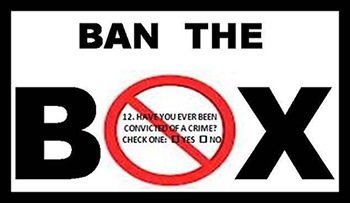Editorial claiming that “Ban the Box” is a bad idea misses the point of the movement
- 12/7/2015
- Kevin Rosenquist
I just read an immensely confusing
editorial from the Chattanoogan about how the “ban the box” movement
is a bad idea. Roy Exum writes about a friend of his who has hired a lot of
ex-convicts that have turned out to be great employees. A great story, without
a doubt. The puzzling part, however, is that he uses this as an example of why
we shouldn’t ban the box.
For those unfamiliar with the movement it hopes to get rid
of the question “have you ever been convicted of a crime” from job applications
because it’s a broad question that is too often used to automatically disqualify
a candidate. Exum’s friend’s point is that when he knows that someone is a
felon he is giving them a chance to turn his or her life around. That person
also knows he or she is getting this chance, thus forming a mutual respect and
high level of trust. I’d imagine that theory doesn’t work for everyone every
time but you can’t argue with the idea; it makes perfect sense. His friend also
states “I owe it to my employees not to bring in a serial
rapist” or someone else “with [a] long history of run-ins with police.” Again,
a totally valid point no one can argue with.
There are two big problems
with this piece. The first one is that it fails to address the whole basis of
the “ban the box” movement, which is that most ex-felons are not given a chance
if they check that box. While I applaud the policies of Exum’s friend and am
moved by his claim that he “has over 20 former convicts from federal prisons
who either work for him or who have retired with their dignity, pride, and self-worth
restored” these results are not the norm. It’s clear that employers have been
and continue to be denying an applicant due to checking the box, thus the push
to have it removed.
The other issue I have with
it is that he fails to mention employee screening at all. Background checks are
vital to a company’s hiring process and very few don’t utilize them. So if an
applicant comes along that Exum’s friend is considering hiring then a background
check can be run on that person. If criminal records are found he can make a
decision on whether to discuss the results with the applicant to see how he
feels about his or her chances of being a good employee despite past
transgressions or take adverse action. It would certainly spot that serial
rapist he was concerned about.
According to a 2014 survey
by CareerBuilder 58% of hiring managers said that they have uncovered a lie on
a job applicant’s resume. If Exum’s friend is not running background checks
he’s certainly putting a lot of faith in the applicants to answer the question
honestly. Exum gives a hypothetical example where a “good-looking, bright eyed
guy in a new suit” applies for a youth coordinator position but just happens to
have a record of child abuse and sexual abuse. It’s a valid concern but is that
meaning to say that the people hiring for the position of youth coordinator
aren’t running thorough background checks? My guess is that they are and if
they aren’t that’s incredibly alarming. Or is he saying that simply by having
the box there it will keep child molesters from applying? It reads as if he’s
assuming everyone always tells the truth and that seems naïve to me.
I know it seems like I’m
picking on the article and its author and maybe I am a bit. There’s more in
there about the NAACP and lists some unsettling statistics on crimes involving
African Americans but for these purposes I wanted to focus on his desire not to
ban the box. The article got me thinking that people are missing the point of
the campaign. It’s not a movement designed to put dangerous criminals among the
law abiding working population. Honestly, it’s designed to get more employers
to do exactly what his friend is doing: give ex-felons a chance to throw their
hats in the ring and prove that their criminal days are behind them and that they
can be productive members of society.





